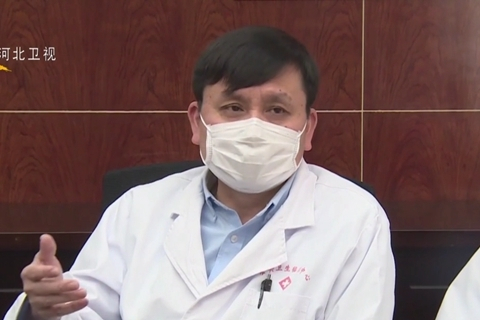Asymptomatic carriers of the novel coronavirus may pose a great transmission risk, experts warned as imported cases become the major challenge China faces as the number of confirmed COVID-19 patients exceeds 600,000 worldwide.
Asymptomatic carriers refer to those who have no symptoms such as fever, coughing or shortness of breath, but are tested positive for the virus. Such people have strong immune systems and don't develop symptoms within 14 days after getting infected. But they may still spread the virus, according to Zhang Wenhong, head of Shanghai's COVID-19 expert team.

File photo of Zhang Wenhong, head of Shanghai's COVID-19 expert team. /CCTV screenshot
File photo of Zhang Wenhong, head of Shanghai's COVID-19 expert team. /CCTV screenshot
"They can carry the virus for more than three weeks. And if they still carry the virus after the required quarantine period (two weeks in China) ends, they will pose great transmission risk," said Zhang at a seminar in Shanghai on Friday.
There have been more than 100 imported cases from other countries in Shanghai, and more and more of them are turning out to be virus carriers with no symptoms, the expert said.
These silent carriers will not be discovered as long as they don't go to the hospitals. Therefore, testing is crucial for all arrivals from other countries at the airport, he explained, adding that Shanghai has been doing so.
"I think the novel coronavirus is one of the most intractable viruses in human history," Zhang said, comparing it to other viruses. He said that although the Ebola virus was aggressive, it didn't spread far and only stayed in Africa. A flu outbreak may be on a larger scale, but its symptoms are mild. SARS is more deadly, but its infectiousness is weaker.
"The difficulty of eliminating this virus may exceed human estimates," the expert said.
Zhang's warning about asymptomatic carriers is echoed by Zhong Nanshan, head of China's COVID-19 expert team. He emphasized that people should not just focus on those with symptoms, while ignoring asymptomatic close contacts of confirmed patients.
"Special attention should be paid to the close contacts (even without symptoms)," Zhong stressed.
"China has taken such cases very seriously. Once confirmed, the patient's close contacts and travel history are traced, which helps us to control the disease in short time."
(Cover photo via VCG)